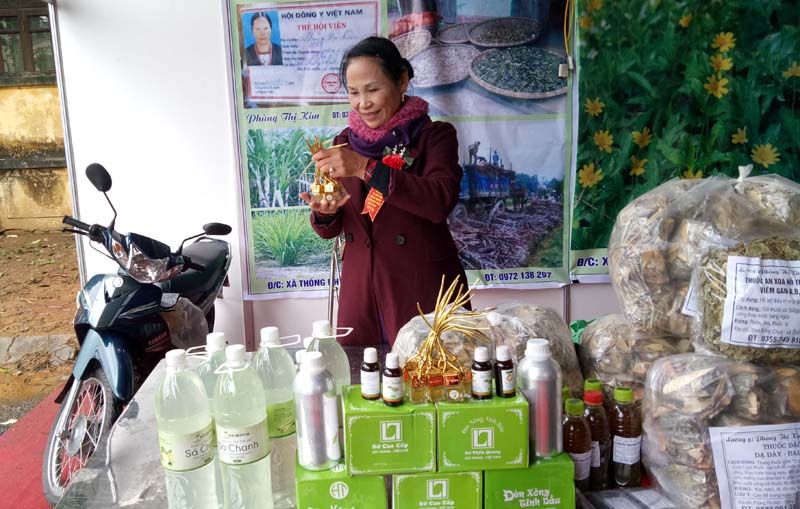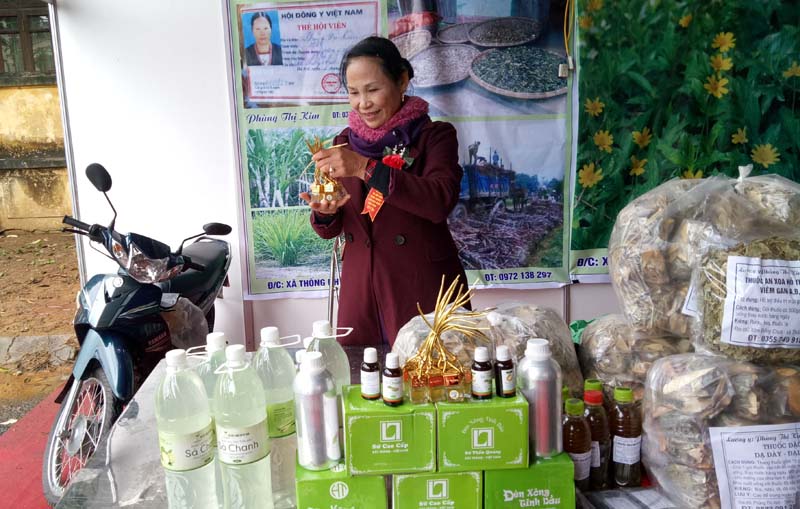
(HBO) - In recent years, identifying the benefits from lemongrass, people in Thong Nhat commune (Hoa Binh city) have actively used the area of gardens and hills for the growth of intercropping lemongrass, bringing high income. In particular, the linkage model between the Agricultural Cooperative of Dao village, Thong Nhat commune with VietMec for the essential oil with high efficiency has opened up a prospect of new economic development, contributing to job creation and revenue increase for the local farmers.
Lemongrass Essential Oil products of the Agricultural Cooperative of Dao village, Thong Nhat commune, Hoa Binh city are for sale at the Agricultural Products Fair of the province in 2018.
Mr. Bui The Dung, the chairman of Thong Nhat People's Committee says that implementing a one-item program in each commune, Thong Nhat commune has chosen the lemongrass as a key product. Thong Nhat lemongrass has the advantage of big tubers and good leaves. It is easy to grow e lemongrass and it does not take much care. Thong Nhat commune currently has about 200 hectares of lemongrass, in which the Agriculture Cooperative of Dao village grows 145 hectares. However, the consumption of products still faces many difficulties and is forced to sell from 3,000 to 5,000 VND/kg by traders. The reason for the cheap price is due to the consumption market
Ms. Nguyen Thi Binh, the director of Dao village’s Agricultural Cooperative says from September 2018, the cooperative has cooperated with VietMec to produce lemongrass products such as essential oil, dishwashing liquid, house cleaning liquid and so on. Accordingly, the cooperative often consumes the lemongrass leaves and small tubers for the households. The cooperative has purchased about 300 tons of tubers and leaves. On average each ton of tubers and leaves extracts from 2.2 to 2.5 liters of essential oil at a selling price of 1.5 million VND a liter. The products from lemongrass of the cooperative are welcomed by consumers in and outside Hoa Binh city because they are natural and environmentally friendly products.
From the end of 2018, the People's Committee of Hoa Binh City has assigned the Economic Department to develop a collective brand scheme for Thong Nhat lemongrass products. Currently, the steps have been basically completed, waiting for the National Office of Intellectual Property to grant a certificate of the collective brand recognition for Thong Nhat lemongrass products. In the coming time, after being granted a certificate of collective brand recognition for Thong Nhat lemongrass, the Economic Department has the intention to stamp the origin of the products. The Agriculture Cooperative of Dao village manages the trademark to affirm the brand, increasing value and bringing Thong Nhat lemongrass brand more widely to increase the income for lemongrass growers in the area.
According to data from the Hoa Binh Provincial Party Committee, the industrial production index for the first six months of 2025 is estimated to have increased by 20% compared to the same period last year. This marks the highest year-on-year growth rate for this period since 2020.
In the first six months of 2025, Hoa Binh province’s export turnover was estimated at 1.145 billion USD, marking an 18.11% increase compared to the same period in 2024. Import turnover was estimated at $ 804 million, a 17.15% increase, which helped the province maintain a positive trade balance.
The lives of the ethnic minority farmers in Tan Lac district have gradually improved thanks to the new directions in agricultural production. This is a testament to the collective strength fostered through the professional associations and groups implemented by various levels of the district’s Farmers’ Union.
With the motto the "product quality comes first,” after nearly one year of establishment and operation, Muong village’s Clean Food Agricultural and Commercial Cooperative, located in Cau Hamlet, Hung Son Commune (Kim Boi district), has launched reputable, high-quality agricultural products to the market that are well-received by consumers. The products such as Muong village’s pork sausage, salt-cured chicken, and salt-cured pork hocks have gradually carved out a place in the market and they are on the path to obtaining the OCOP certification.
In the past, the phrase "bumper harvest, rock-bottom prices" was a familiar refrain for Vietnamese farmers engaged in fragmented, small-scale agriculture. But today, a new spirit is emerging across rural areas of Hoa Binh province - one of collaboration, organisation, and collective economic models that provide a stable foundation for production.
Maintaining growing area codes and packing facility codes in accordance with regulations is a mandatory requirement for agricultural products to be eligible for export. Recently, the Department of Agriculture and Environment of Hoa Binh province has intensified technical supervision of designated farming areas and packing facilities to safeguard the "green passport" that enables its products to access international markets.



